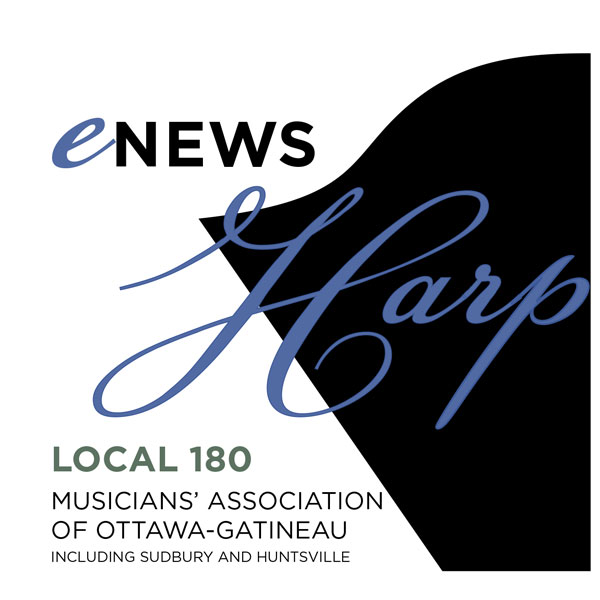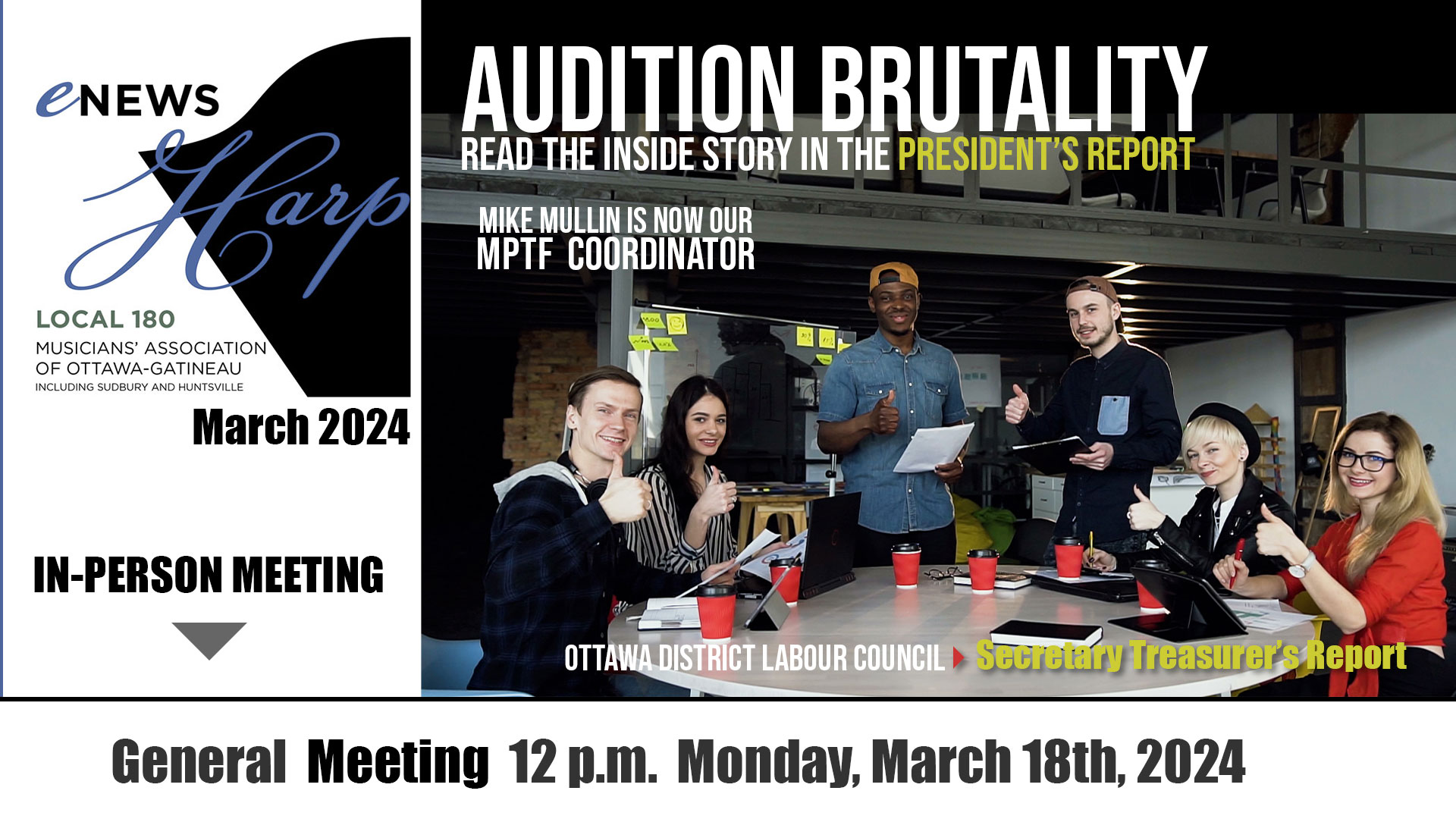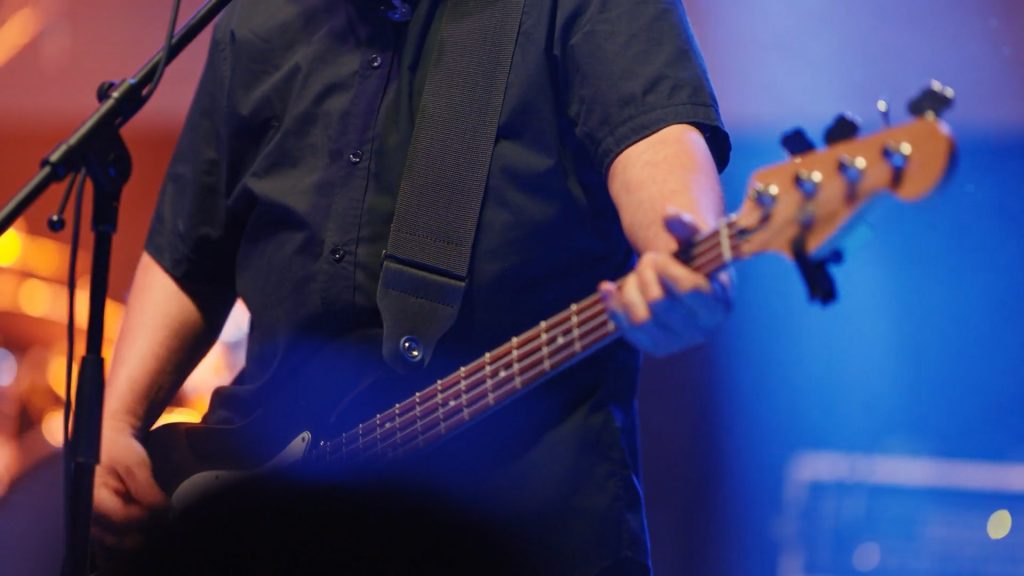Officers
President, Francine Schutzman;
Vice President, Gary Morton;
Secretary-Treasurer, Robin Moir
Executive Board
Lance Elbeck
Mike Mullin
David Renaud
Sean Rice
Delegates to AFM Convention
Francine Schutzman
Robin Moir
President Emeritus
Glenn Robb
Office Staff
Administrative Officers:
Dan Blackwell
Marlene Morton
MPTF Coordinator: Mike Mullin
Website: Dave Poulin
DISCLAIMER
Your officers and editorial staff conscientiously screen all advertising submitted to the eNewsHarp. However, we cannot assume responsibility for product quality or advertising content, nor can your officers be held accountable for misrepresentations between side persons and leader/contractors.
Local 180 publishes the eNewsHarp on-line four times a year. In an election year, we also publish an election issue for members.
President’s Message
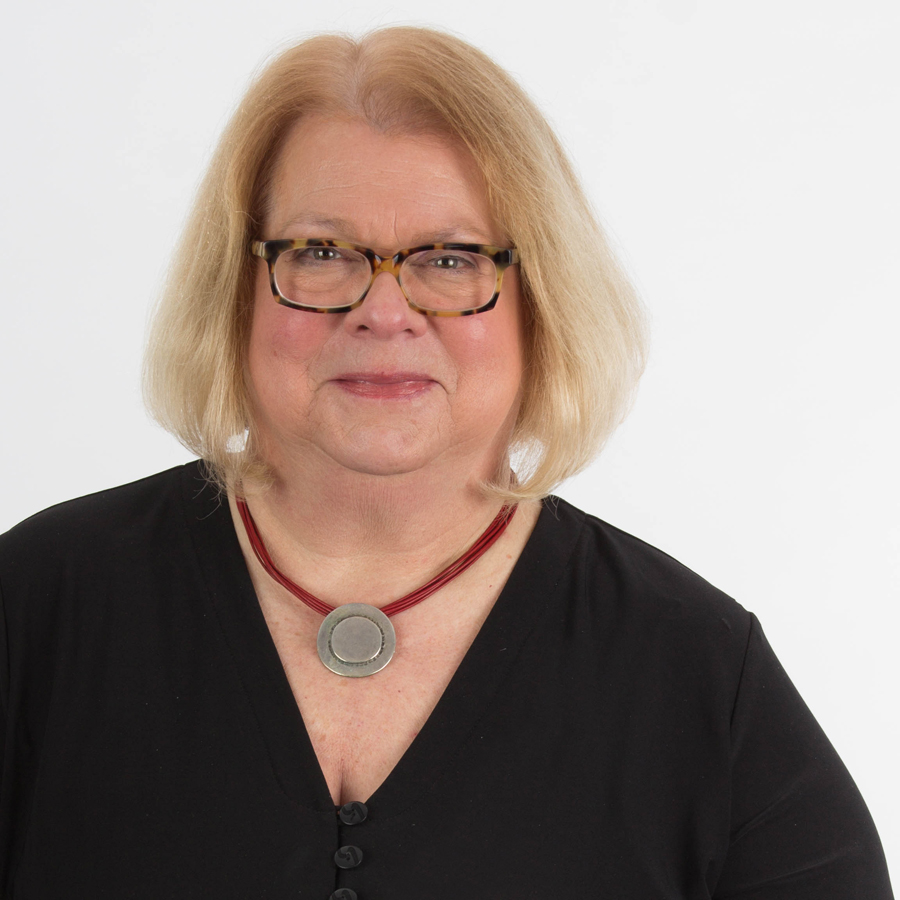
Francine Schutzman
Facing The Firing Squad –
Then and Now
As I write this, I am starting a break between two sets of auditions for the National Arts Centre Orchestra. It has occurred to me that those of our members who have not auditioned for an orchestra might be curious about the actual procedure, so I’m going to write about how things are with the NAC and with some of the auditions that I myself have taken.
You probably know that auditions are screened these days. This is done in an attempt to make them as blind as possible, so that the audition committee can’t tell, for example, if a candidate is a man or woman. Some candidates take off their shoes for further anonymity, but since there is often a carpeted walkway to the centre of the stage (or audition room, if that is the case), this is usually not necessary.
When I first started auditioning for oboe and English horn jobs, though — too many years ago to mention now! — auditions were not held behind a screen, and we could stand around and listen to each other play. I actually liked being able to feel a human connection with the people on the committee, but I know for a fact (because I was told verbally but unfortunately never in writing) that I didn’t get a couple of jobs because I was a woman. One of my conservatory classmates won a principal oboe job in a major US orchestra by unanimous decision of the audition committee, but the board of directors wouldn’t hire her because of her sex. She later became the first woman to hold a principal oboe position in any major US orchestra.
Luckily, by the time I auditioned for the NAC Orchestra, things were starting to change. The audition was not done behind a screen, but I was hired anyway — the first woman in the wind section of NACO. If you go to a concert now at the NAC, you’ll be able to see how much things have changed!
My role these days, as President of Local 180, is to represent the Local at orchestra auditions. I sit between the candidate and the committee, at the end of the screen, to verify that things are done according to the collective agreement. To date, there has almost never been a problem, especially since the personnel manager of NACO, who is in charge of all the arrangements for the audition and who ushers the candidates in and out of the room, is very careful to observe the conditions we have agreed upon.
Auditions for NACO are all screened now, and it was decided in the most recent set of negotiations for the collective agreement not to give the results of each round to the audition committee. The committee votes after each set of five or six players to determine if any of them will advance to the next round. Not knowing, for example, that candidate number 2 has advanced makes the committee listen to everyone with a fresh set of ears. After the first round, there is no discussion except in the case of a tie. In the second and third rounds, discussion is allowed before the vote.
Another way things have changed is that, when I was auditioning for orchestra jobs, audition lists were not always provided. You could be asked to play anything in the orchestral repertoire, and there was quite often a piece to be sight-read. That was the case when I auditioned for NACO. It was an additional surprise to the then-principal oboist, Rowland Floyd, and me when we were asked to play some duets together. These days, a list is sent to the candidates in advance, and at least for NACO there is no sight-reading. That doesn’t necessarily make things easier, as candidates still have just a few minutes to try to catch the attention of the committee.
The committee listens for the obvious things — note accuracy, good pitch, attention to the markings in the music, steady tempo, etc. — and then hopes for something beyond those markers. It’s actually the rare candidate who can soar beyond the obvious to make music beautifully enough that a few technical glitches here and there can be overlooked. It’s the rare musician who can play both perfectly and beautifully under such pressure. And it’s heartbreaking when you hear someone who is obviously very musical but who is just having a bad day, with simply too many mistakes to ignore.
No matter how it’s done, auditioning is a brutal exercise. Many people feel that it is unrelated enough to actually playing in an orchestra that some other method should be used. To be clear, the NACO auditions do involve a trial period in the orchestra before someone is offered a job, but many orchestras don’t have that. I feel that it is a huge help to see how someone fits musically with the ensemble before they go through the trouble of moving to another city and perhaps not winning the job permanently after their probationary period, which can last a year or two.
So how else could we find the best person to fill an orchestral position? In the Olden Days, prominent teachers might be called to see which of their students should be offered a job in this orchestra or that. Sometimes people feel that Musician X, who has been playing extra with a given group for a number of years and doing a fine job, should just be given a job. But having an open audition, brutal though it can be, gives one the opportunity to hear people who might not be discovered any other way — someone just out of school, for example, or who might have been teaching in a university for the past number of years. In my opinion, it’s like democracy: it might not always work out the way one would like, but it’s better than any other system out there.
Francine
Rapport de la président
Affronter le peloton d’exécution, autrefois et à l’heure actuelle
Alors que j’écris le présent article, je prends une pause entre deux auditions pour l’Orchestre du Centre national des Arts. Il m’est venu à l’esprit que les membres n’ayant pas encore eu l’occasion d’auditionner pour un orchestre seraient peut-être curieux de connaître la marche à suivre. En outre, voici une description de la marche à suivre de l’OCNA et de quelques auditions auxquelles j’ai moi-même participé.
Vous savez sans doute que les auditions sont maintenant tenues derrière un écran. Cela vise surtout à en faire une sélection à l’aveugle afin que le comité d’audition ne puisse savoir, par exemple, le sexe de la personne passant l’audition. Certains candidats enlèvent leurs souliers pour nuancer davantage le principe d’anonymat. Cependant, comme l’allée menant au centre de l’estrade (ou à la salle d’’audition, le cas échéant) est souvent recouverte d’un tapis, cette mesure n’est pas nécessaire.
Lorsque j’ai commencé à auditionner pour le hautbois et le cor anglais – il y a trop longtemps pour le préciser maintenant! – les auditions n’étaient pas tenues derrière un écran, et nous pouvions rester et écouter la prestation de chacun. J’aimais bien sentir un rapport humain avec les membres du comité, mais je sais pertinemment (parce qu’on me l’a dit verbalement mais malheureusement jamais par écrit) que je n’ai pas obtenu certains emplois parce que j’étais une femme. Une de mes camarades de classe a obtenu, par décision unanime du comité d’audition, un poste comme hautbois solo dans un grand orchestre américain. Cependant, le conseil d’administration a refusé de l’embaucher en raison de son sexe. Par la suite, elle est devenue la première femme parmi tous les orchestres américains importants à tenir le poste de hautbois solo.
Heureusement, au moment où j’ai auditionné pour l’Orchestre du CNA, les choses commençaient à changer. L’audition n’avait pas lieu derrière un écran, mais j’ai tout de même été embauchée – la première femme à faire partie de la section des instruments à vent de l’OCNA. Si vous assistez à un concert au CNA aujourd’hui, vous pourrez constater à quel point les choses ont changé!
Présentement, mon rôle de présidente de la Section locale 180 consiste à représenter la Section locale aux auditions d’orchestre. Je m’installe entre le candidat et le comité, au bout de l’écran, afin de veiller à ce que tout se déroule conformément à la convention collective. À ce jour, ce fut rarement problématique, surtout parce que la directrice du personnel de l’OCNA, qui est responsable de tous les préparatifs de l’audition et qui accompagne les candidats dans et de la pièce, se préoccupe vraiment de respecter les conditions convenues.
Toutes les auditions pour l’OCNA se déroulent maintenant derrière un écran. De plus, dans les dernières négociations de la convention collective, il a été convenu de ne pas dévoiler les résultats de chaque ronde au comité d’audition. Le comité vote après chaque groupe de cinq ou six artistes exécutants pour déterminer s’ils avancent à la prochaine ronde. S’il ne sait pas, par exemple, que le candidat numéro 2 a avancé, le comité écoute tous les candidats avec une oreille attentive. Après la première ronde, aucune discussion n’a lieu sauf en cas d’égalité. À la deuxième et à la troisième ronde, les discussions sont permises avant le vote.
Il y a aussi un autre changement à mentionner. Lorsque j’auditionnais pour des postes au sein d’un orchestre, la liste des passages musicaux n’était pas toujours fournie. L’on pouvait vous demander d’exécuter n’importe quelle pièce du répertoire de l’orchestre, et il y avait souvent une lecture à vue. C’était le cas lorsque j’ai auditionné pour l’OCNA. Ce fut une surprise supplémentaire, tant pour le hautbois solo du moment, Rowland Floyd, que moi-même, lorsqu’on nous a demandé d’interpréter des pièces en duo. De nos jours, les candidats reçoivent une liste à l’avance et l’OCNA n’exige aucune lecture à vue. Cela ne facilite pas nécessairement les choses, alors que les candidats n’ont que quelques minutes pour capter l’attention du comité.
Le comité écoute pour des raisons évidentes – la précision des notes, une bonne tonalité, une attention aux nuances dans la musique, un tempo constant, etc. – puis il espère quelque chose au-delà de ces indicateurs. Il est plutôt rare qu’un candidat surpasse toutes les attentes en offrant une prestation musicale si belle qu’elle permet d’oublier quelques pépins techniques ici et là. Il est également rare qu’un musicien soumis à une telle pression puisse s’exécuter parfaitement et magnifiquement à la fois. C’est aussi déchirant d’entendre une personne évidement aussi musicale vivre une journée difficile, avec des erreurs trop nombreuses pour qu’on puisse les ignorer.Peu importe la façon de faire, l’audition s’avère un exercice brutal. Plusieurs personnes croient que c’est assez indépendant de l’exécution dans un orchestre pour utiliser une autre méthode. Mais soyons clairs, les auditions de l’OCNA comprennent une période d’essai au sein de l’orchestre avant d’offrir un poste à quelqu’un. Toutefois, plusieurs orchestres n’offrent pas cette option. À mon avis, cela nous aide énormément à voir comment une personne s’adapte musicalement avec l’ensemble avant qu’elle ne se déplace vers une autre ville sans avoir la certitude d’un emploi permanent après la période probatoire, laquelle peut s’étendre sur une ou deux années.
Par ailleurs, quel autre moyen pourrions-nous utiliser pour trouver la meilleure personne à combler un poste dans un orchestre? Autrefois, l’on faisait parfois appel à d’éminents professeurs pour connaître les élèves à qui offrir un poste dans un orchestre quelconque. Il arrive parfois que les gens croient que le musicien X, qui a été suppléant dans un groupe donné pendant bon nombre d’année et qui a bien réussi, devrait simplement se voir offrir un emploi. Toutefois, la tenue d’une audition ouverte, bien qu’elle puisse être brutale, permet d’entendre des personnes qui ne seraient pas découvertes autrement – une personne nouvellement diplômée, par exemple, ou une personne qui a enseigné à l’université pendant un certain nombre d’années. Selon moi, c’est comme la démocratie : ce n’est peut-être pas toujours aussi efficace que nous le voudrions, mais c’est mieux que tous les autres systèmes.
Francine

Secretary Treasurer’s Message
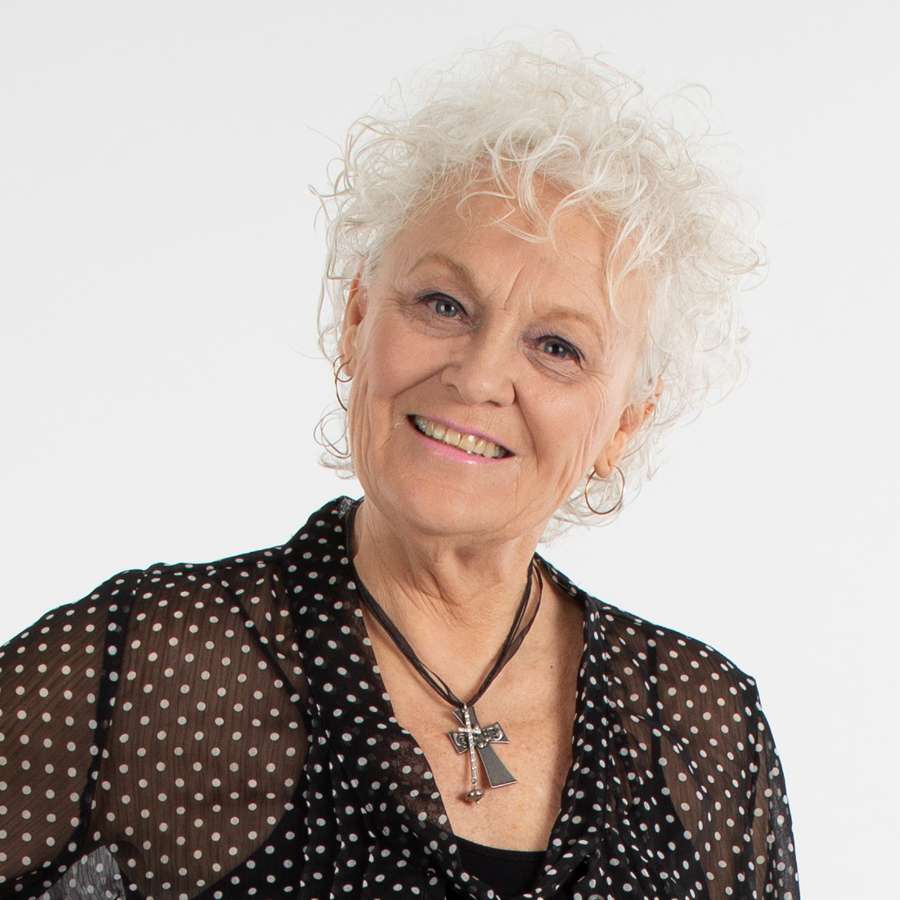
Robin Moir
Spring Can’t Be Far Away
As I am looking out of the office window, I see the snow falling gently outside. The snow says Winter, but the mild temperatures indicate that Spring can’t be far away.
2023 was a very busy year in the office, and we are finding that the music scene is back on track and, to complete the metaphor, chugging along quite nicely. We have many new members and are delighted to welcome them to the Local! The MPTF streams are going very well, and the Local has received many compliments about the quality of the music and the presentations.
Some things that often get overlooked when it comes to the business of the Local are the many groups that we work with during the year. The Ottawa and District Labour Council (ODLC) is one of those groups.
The AFM Bylaws say:
Locals should build coalitions and act in solidarity with other organizations that share our concern for social and economic justice.
Our own Bylaws underscore that:
This Association shall be affiliated with the Canadian Labour Congress (AFL-CIO) through membership in the Ottawa District Labour Council, and other affiliations shall be determined by the Executive Board.
And so, it has been for many years that our relationship has matured and grown with the ODLC. It helps that their offices are located in our building on the fifth floor, and as many of you may know, they allow us to use their board room (free of charge) for our quarterly General Membership meetings (we always order extra pizza!).
Since it was founded in 1872, the Labour Council has served and represented workers in Ottawa.The Labour Council’s ninety affiliated union locals reflect the whole spectrum of organized labour in Canada. Public and private sector, clerical, service, and industrial workers join through the Labour Council to give a voice to their concerns.
Directly chartered by the Canadian Labour Congress (CLC) and affiliated to the Ontario Federation of Labour (OFL), the Council speaks out as labour’s voice on municipal, provincial, and national issues and promotes the social and economic welfare of workers and all Canadians. It is this body that the CLC and OFL turn to conduct their policies in the community.
The Labour Council participates in several educational and service-oriented projects on an ongoing basis. They also appoint labour representatives to United Way East Ontario, the Occupational Health Clinics for Ontario Workers (OHCOW) and the Ottawa Community Benefits Network (OCBN), to name a few.
The Ottawa and District Labour Council (ODLC) Executive Board is comprised of twelve members (5 officers plus seven executive). Our membership in the ODLC means that we pay our per capita dues quarterly. It also means that we have the opportunity to vote in their elections, which are held every three years. The current president of the ODLC is Sean McKenny. He was recently reelected for another three-year term, and our delegates took part in that election, which this year was held online.
Sean always makes a point of dropping by our offices to chat about the labour movement and what is happening with our Local and our members. He is involved with all Ottawa-based Locals, ensuring that they have the support that they need from the ODLC and that other unions are aware of their particular circumstances. His office keeps all members up to date with what is happening locally, regionally, and nationally. He is in fact the spokesperson for all things labour and union-related, and you may often see him interviewed when labour-related issues are in the forefront.
Local 180 has supported the annual ODLC Labour Day Parade and Picnic for over 35 years. Our members march in the parade and entertain the picnic-goers in the afternoon. We have also sent out members to support strikers when needed. It is wonderful how music can make the hours go by on the picket line!
Although we are an arts-based union, we have much in common with other unions. We are concerned about the welfare of our members; we work hard to ensure that they are paid fairly; we mandate that pension contributions are guaranteed with each signed contract that comes through our office; we are able to offer members solid liability insurance that venues are requesting on an ongoing basis; and we hold quarterly general meetings to communicate and share information and ideas with our members. When it comes to unions, we all want the same things – fairness, equality, and solidity in the workplace.
Sean McKenny, as the ODLC President, is able to bring his knowledge about other unions in the municipality into our conversations, which is beneficial to us. I value the relationship that the Local has with the ODLC, and in particular Sean and his assistant Jennifer Moore. They are an invaluable source of information when labour-related questions arise.
It is a short ride to the fifth floor to ask questions about something a union worker needs to know. I think of our members not only as artists and musicians, but also as wage-earners working diligently to keep their families secure, safe, and well-fed. The relationship with the ODLC ensures that all of its members, including Local 180, are constantly being kept informed as to what’s going on in the labour movement and what that means for our members.
Robin
Rapport de la secrétaire trésorière
Le printemps sera bientôt à nos portes
En regardant par la fenêtre du bureau, je vois la neige tomber doucement. La neige rappelle l’hiver, mais la température modérée laisse croire que le printemps sera bientôt à nos portes.
Le bureau a été très achalandé en 2023, et à notre avis, la scène musicale est de retour sur les rails. Puis, pour compléter la métaphore, elle avance plutôt bien. Nous comptons plusieurs nouveaux membres et nous sommes enchantés de les accueillir à la Section locale! Les diffusions du MPTF vont bon train et la Section locale a joui de bon nombre de compliments sur la qualité de la musique et des prestations.
Parmi les choses qui passent souvent inaperçues dans le contexte des affaires de la Section locale sont les nombreux groupes avec lesquels nous travaillons pendant l’année. Le Conseil du travail d’Ottawa et du district (CTOD) s’avère l’un de ces groupes.
Les Règlements administratifs de l’AFM stipulent :
Les sections locales devraient créer des coalitions et agir en solidarité avec d’autres organismes qui partagent notre préoccupation pour la justice sociale et économique.
Nos propres Règlements administratifs soulignent :
Cette association sera affiliée au Congrès du travail du Canada (AFL-CIO) par l’entremise de l’adhésion au Conseil du travail d’Ottawa et du district, et le Conseil exécutif déterminera d’autres affiliations.
En conséquence, notre relation avec le CTOD a grandi et gagné en importance pendant de nombreuses années. C’est utile que leur bureau soit au cinquième étage de notre édifice, et comme plusieurs le savent, qu’ils nous permettent d’utiliser leur salle de conférence (gratuitement) pour tenir nos assemblées générales trimestrielles (nous commandons toujours des pizzas supplémentaires!).
Depuis sa création en 1872, le Conseil du travail a servi et représenté les travailleurs à Ottawa. Les 90 syndicats affiliés du Conseil du travail reflètent l’éventail complet du travail organisé au Canada. Les secteurs public et privé, les employés de bureau, les travailleurs pour les services et les travailleurs industriels s’unissent par l’entremise du Conseil du travail afin de véhiculer leurs inquiétudes.
Étant reconnu comme organisme à charte directe par le Congrès du travail du Canada (CTC) et étant affilié à la Fédération du travail de l’Ontario, le Conseil se fait le porte-parole du travail par rapport aux enjeux municipaux, provinciaux et nationaux. De plus, il favorise le bien-être social et économique des travailleurs et de tous les Canadiens. C’est vers cet organisme que se tournent le CTC et la FTO pour mener leurs politiques dans la communauté.
Le Conseil du travail participe de façon continue à plusieurs projets éducatifs et à des projets axés sur la prestation de services. Il désigne aussi des représentants du travail à Centraide Est de l’Ontario, au Centre de santé des travailleurs et travailleuses de l’Ontario (OHCOW) et au Ottawa Community Benefits Network (OCBN) pour n’en nommer que quelques-uns.
Le Conseil exécutif du Conseil du travail d’Ottawa et du district (CTOD) est composé de 12 membres (5 dirigeants et 7 exécutifs). En raison de notre adhésion au CTOD, nous payons trimestriellement une cotisation par personne. De plus, nous avons l’occasion de voter lors de ses élections, lesquelles ont lieu à tous les trois ans. Sean McKenny est le président actuel du CTOD. Il a récemment été réélu pour un autre mandat de trois ans, et nos délégués ont participé à cette élection, laquelle a été tenue en ligne.
Sean prend toujours la peine de passer au bureau pour échanger sur le mouvement ouvrier et prendre des nouvelles de notre Section locale et de nos membres. Il s’implique avec toutes les sections locales du territoire d’Ottawa, veillant à ce qu’elles aient le soutien nécessaire du CTOD et à ce que d’autres syndicats soient conscients de leurs circonstances particulières. Son bureau tient tous les membres au courant de ce qui se passe à l’échelle locale, régionale et nationale. En fait, il est le porte-parole de tout ce qui est lié au travail et aux syndicats, et vous le verrez souvent interviewé lorsque des enjeux relatifs à l’emploi sont au centre des préoccupations.
La Section locale 180 appuie, depuis plus de 35 ans, le défilé annuel de la fête du Travail et pique-nique du CTOD. En effet, nos membres participent au défilé et divertissent les pique-niqueurs l’après-midi. Nous avons aussi délégué des membres pour soutenir les grévistes, le cas échéant. C’est merveilleux de voir combien la musique peut faire écouler rapidement les heures sur la ligne de piquetage!
Bien que nous soyons un syndicat axé sur les arts, nous avons bien des choses en commun avec d’autres syndicats. Nous nous préoccupons du bien-être de nos membres; nous travaillons ardemment à ce qu’ils soient équitablement rémunérés; nous avons comme mandat de garantir les cotisations de retraite avec chaque contrat signé présenté à notre bureau; nous sommes en mesure d’offrir à nos membres une assurance responsabilité fiable qu’exigent de façon continue les salles de spectacles; et nous tenons des assemblées générales trimestrielles afin de transmettre et de partager de l’information et des idées à nos membres. Lorsqu’il est question de syndicats, nous voulons tous les mêmes choses – l’équité, l’égalité et la solidité au travail.
À titre de président du CTOD, Sean McKenny est en mesure d’intégrer dans nos conversations son savoir au sujet d’autres syndicats de la municipalité, ce qui s’avère avantageux pour nous. Je valorise grandement la relation de la Section locale avec le CTOD, et particulièrement avec Sean et son adjointe, Jennifer Moore. Ils sont une source d’information inestimable lorsque des questions liées au travail surviennent.
Il faut seulement quelques minutes pour se rendre au cinquième étage et poser des questions sur un sujet important pour un travailleur syndiqué. Je pense à nos membres non seulement en tant qu’artistes et musiciens, mais aussi en tant que salariés travaillant assidûment à assurer la sécurité de leurs familles et à veiller à ce qu’elles soient bien nourries. La relation avec le CTOD garantit que tous ses membres, y compris la Section locale 180, soient constamment à l’affût de la situation actuelle du mouvement ouvrier et de son incidence sur nos membres.
Robin
We encourage all of our members to join PAL (palottawa.org)
Please see their website and the March eNewsHarp for details about the organization and the planned residence for members of the arts community. It is not too soon to sign up for affordable housing for retirees, even if you are not sure that you’ll need it. And if you are not close to retirement, your membership will help the organization to focus on the needs of our community.



LIVE MUSIC WORKERS FUND
After receiving an unprecedented number of applications of the Live Music Workers Fund, we reopened the application.
Since the official application launch we have received thousands of submissions, making it very clear that our industry is in great need of this help. We are so proud and appreciative of the work you and your organizations have all done and continue to do to ensure that everyone in the Canadian Live Music Industry has access to this funding. While the pandemic may appear to be over, it continues to negatively impact the livelihoods of people in our community.
Attached (below) is the step-by-step guide to the application in English and French, which includes the link to the application.
Détails de l’application étape par étape
Attend in-person LOCAL 180 GENERAL MEETING
Monday, March 18th @ 12:00 p.m.
If you know ahead of time that you’re attending in-person, please notify dan@ma180.org so we know how much pizza to order.
Relief Fund Alive and Well
The Relief Fund was established by Local 180 to help those musicians most greatly affected by the pandemic. Thanks to the generous donations made by our own members, with a special shout-out to the musicians of the NAC Orchestra, we plan to maintain the Relief Fund and to add to it. The pandemic may appear to be over, but its effects will linger for a long time, and one never knows what is around the corner. So here are a couple of things to keep in mind:
If you need assistance, or if you are aware of a fellow member who needs it, send a message to Robin. We do not ask those who need funds to justify the need or tell us what they will be used for. We assume that if you ask for help, you genuinely need it.
If you are in a position to do so, please contribute to the fund. You might need to tap into it some day yourself.
IN-PERSON GENERAL MEETING
Monday, March 18th, 12:00 PM
Please let Dan know (dan@ma180.org) if you will be attending so that we know how much pizza to order.
OBITUARIES
Peter Turner and Kyle Jordan
Maurice Momy
Composter, Arranger, Copyist, Pianist – 1930-2024
Maurice, a trained concert pianist, composer and piano teacher of 40 years devoted his life to all that was beautiful in music and the arts. His knowledge, enthusiasm and dedication were shared with family, friends, and pupils alike. He was respected and admired by all who knew him.


Bernard Eberley
1 OCTOBER, 1933 – 25 JANUARY, 2024
Bernie was a member of the RCMP band for 37 years which allowed him to travel across Canada and abroad. Following his retirement, his love of music led Bernie to play several instruments for the Maple Leaf Brass Band and the Ottawa Fireman’s Band. He was also involved in his community playing the piano and organ for the Sainte Geneviève and St-Thomas d’Aquin parishes for over 20 years.
A dedicated family man, Bernie loved to spend time taking his family to the RCMP Long Island Centre (summer camp). He also loved spending time with family and friends on the golf course.
May Bernie rest in peace, he will be missed.
MEMBERSHIP MATTERS
Employer Payroll Service:
When the services of an Employer Payroll Service are required, that fee will be calculated at 25% of each contract total.
This amendment reflects what is happening on a national level.
New Members
Alexander Flamand, Dallas – Vocalist, Guitar
Baker, Nicholas-Benjamin – Guitar
Batiancila, Naomi – Piano, Vocalist, Flute, Guitar
Bauby, Lucie – Flute, Piccolo
Belanger, Xavier – Bass
Delbridge, James – Vocalist, Guitar
Dixon, Kevin – Piano, Keyboard
Everitt, Stewart – Bass
Howard, Matt – Drums, Percussion, Vocalist, Guitar
Hui Litster, Jack – Drums, Percussion, Piano, Vocalist, Guitar
Inkman, Charles – Cello
LeBlanc, Sara -Oboe
Levesque, Sierra – Vocalist, Guitar, Piano, Drums, Bass
MacKenzie, James – Percussion, Keyboard
Mauricio-Cardilli, Maximillion – Double Bass
Maxam, Cory – Guitar, Vocalist, Percussion
McLean, Justin – Bass Trombone, Tuba, Euphonium
Obert, Gabor – Guitar, Keyboard
Ohashi, Douglas – Double Bass
Oliveira-Gervais, Maxime – Guitar
Riddiford, Brett – Bass
Rowland, Graham – Trumpet
Sachs, Thomas (Did Not Specify)
2AFM ID Numbers
Dear Members,
For the purposes of filing contracts, the Musicians’ Pension Fund of Canada has done a great deal of work to protect the privacy of members in terms of SIN numbers. Canadian Locals are now permitted to use an AFM ID number in lieu of a SIN number on all contracts.
When sending funds from the Local 180 office, we will require you to know your AFM ID number.
Beginning in January this year, the office has included your AFM ID number on your membership dues receipt, which you received in the mail.
You may also go to cfmusicians.org and register there to obtain your AFM ID number and update any information. The good thing about registering on the site is that when you update your personal information, it is also received in the office so that we are current.
Upcoming Local 180 General Meetings in 2024
March 18, 2024 – 12:30 PM
June 17, 2024 – 12:30 PM
September 9, 2024 – 12:30 PM
December 16, 2024 – 12:30 PM
LOCAL OFFICE HOURS
Monday to Friday 10:00 AM – 4:00 PM
Attention Members!!!
Due to popular demand members may now pay membership dues using E-Mail Transfer using the email address
Once we process the transfer, we will send you an electronic receipt.
____________
If you are planning to file contracts electronically in 2022, please use
our new e-mail address:
Thank you!
_____________
YOU’VE GOT MAIL & MONEY TO DEPOSIT!!!
Do we have your current email address?
The Local 180 Office sends out important advisories to members by email and we want to make sure that you’re reachable. This year the Local will also be paying most musicians using E-Transfer and Direct Deposit, so we MUST have your correct e-mail address.
Please notify the office of any changes to your contact information. Include your phone number, home address and email address.
Call (613)700-9260 to make sure that we have your correct contact information.
A REMINDER ABOUT EXPELLED MEMBERS
A person who has been expelled from our Association is no longer a member of the Association or the AFM. Members and leaders are reminded:
Do not play engagements with non-members. Persons are generally expelled for serious violations of our Constitution and Bylaws. Expulsion is not a life sentence; the individual has the right to settle these matters with the Board and regain member status. But until that step has been taken, we urge leaders and members not to give non-member rights and privileges which belong only to members.
Next Deadline for Membership Dues January 31, 2023
PENALTIES
TO REINSTATE FROM RESIGNING IN GOOD STANDING – $10.00
TO REINSTATE FROM SUSPENSION – $35.00
TO REINSTATE FROM EXPULSION – $45.00
Attention: all contractors, leaders, and musicians
For performances posted online, there is a new requirement.
The General Production Agreement (GPA) is mandatory for the protection members.
The GPA is mandatory for:
any engagement that is live streamed.
any live engagement that is posted online for public viewing.
Every clause in the price list is subject to the use of the GPA when engagements are live streamed and/or posted online.
A GPA is essential to protect the digital image of members if a third party exploits a performance that is publicly available online. See Local 180’s recently updated price list for current information.
To protect members, contractors must:
- ask clients whether the engagement will be live-streamed, posted publicly, or be kept for archival purposes (no GPA is required for strictly archival purposes; however, Local 180 has a report form that contractors must complete)
- contact the Secretary-Treasurer of Local 180 to complete a GPA when an engagement will be live-streamed or posted publicly.
It is the duty of the contractor and leader to ensure that members are properly protected.
If a client live streams or posts a performance publicly and GPA is in place, contractors, leaders, and musicians should contact the Secretary-Treasurer promptly to guarantee the protection of members.
The Local 180 office will work with you to make the contract process for the GPA an easy one!
ATTENTION MUSIC TEACHERS!!!

If you would like to have your name included in the Music Teacher’s Directory on the ma180.org website, please contact Dan Blackwell who is currently collecting the data.
Please include all teaching disciplines.
EG: Vocals, Guitar, Violin, Percussion etc. etc.
This database will be featured on the ma180.org website.
Thank you!
MUSICIANS’ MEMBERSHIP DIRECTORY ONLINE

Members have requested that we maintain a current and accurate copy of the Local Membership Directory found in the Members’ Only section of our website.
However, we do have members that wish to keep certain information found in the directory private.
If you would like to ensure that your privacy is protected, please let us know.
Please contact either Robin or Dan.

Your business is music to our ears.
You spend hours perfecting your talent and invest in equipment which allows you to express it.
HUB International is in-tune with your needs and has you covered.
PROGRAM FEATURES
HUB PROGRAM COVERAGES
-
All-risks’ coverage on your instruments and equipment
-
Worldwide coverage – no Territory Exception
-
Rental Reimbursement — up to $10,000 in coverage, if you need to rent instruments or
equipment in the event of a loss -
$100 deductible per occurrence on instruments and equipment, as opposed to other proposed rates are $250
-
Up to $2,500 coverage on promotion material, T-shirts, CD’s, posters, etc.
-
Loss of earnings up to $5,000 due to loss or damage to venue
-
Loss of earning up to $5,000 due to loss or damage to equipment
-
Locked vehicle – no exclusion
-
Rented, Leased or Borrowed Equipment, $10,000 limit up to 30 consecutive days
-
Optional Commercial General Liability including bodily injury, property damage, medical payments, tenants legal liability and non-owned automobile
RATES AND PREMIUMS
-
$2.20 rate per $100 sum insured for Instruments and Equipment ($100 deductible)
Liability rates ($500 deductible):
-
$1,000,000 limit – $66/member
-
$2,000,000 – $127/member
Higher limits available upon request
-
APPLY FOR COVERAGE
Cristina Omar| cristina.omar@hubinternational.com | 519-325-1785 | TF:800-463-4700

